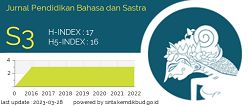ANALYSIS OF GRAMMATICAL INTERFERENCES IN THE ORAL COMMUNICATION PRESENTED BY PIBBI PARTICIPANTS
Abstract
This present study aims to analyse and describe features of L1 interference in oral communication by PIBBI Participants of Level 5 who enrolled in an intensive language program at LTC, SWCU. The data were collected by giving oral tasks when describing something, giving opinion and explaining how things work. A stimulated recall interview proposed by Dornyei (2007) was used to explore the findings in detail. The analysis presents the type of grammatical interferences, the frequency of occurrence of each interference type and their detailed description. Analysis of data revealed that students in high level still experience grammatical interferences in producing Indonesian speech. It is hoped that this study will give a better suggestion for the advanced foreign language learners and provide information for teachers on common interferences in language learning which can be used as a reference in developing the teaching materials.
Keywords
Full Text:
PDFReferences
Bennui, P. (2008). A Study of L1 Interference in the Study of Thai EFL Students. Malaysian Journal of ELT Research, 4,pp.72-102.
Chang, S., Mahadhir, M., & Ting, S. (2010). Grammatical Errors in Spoken English of University Students in Oral Communication Course. GEMA Online Journal of Second Language Studies, 10 (1), pp.53-70.
Cowan, R. (2008). The Teacher’s Grammar of English. Cambridge: Cambridge University Press.
Creswell, J. W. (2007). Qualitative Inquiry and Research Design: Choosing among Five Approaches. Thousand Oaks, CA: Sage.
Dornyei, Z. (2007). Research Methods in Applied Linguistics. Oxford: Oxford University Press.
Dulay, H., Burt, M. &Krashen, S. (1982). Language Two. New York: Oxford University Press.
Ellis, R. (1986). Understanding Second Language Acquisition. Oxford: Oxford University Press.
Ellis, R. (1994).The Study of Second Language Acquistion. Oxford: Oxford University Press.
Ellis, R. (1997). Second Language Acquistion. Oxford: Oxford University Press.
James, C. (1998). Errors in Language Learning and Use: Exploring error analysis. London: Longman
Lekova, B. (2010). Language Interference and Methods of its Overcoming in Foreign Language Teaching. Trakia journal of sciences, 8,pp.320-324.
Mackey, W. F. (1969). Language Teaching Analysis. London: Longmans Green & Co. Ltd.
Nation, I. S. P. (1997). L1 and L2 use in the Classroom: a Systematic Approach. TESL Reporter 30 (2), pp.19-27.
Nation, I. S. P. (2001). Learning Vocabulary in Another Language. Cambridge: Cambridge University Press.
Nation, I. S. P. (2003). The Role of the First Language in Foreign Language Learning. Asian-EFL-journal 5 (2). Retrieved May 25, 2009 from http://www.asian-efl-journal.com/june_2003_PN.php.
Nunan, D. (2001). Bilingualism. In Carter, R., &Nunan, D. The cambridge guide to teaching English to speakers of other languages (pp. 93-99). New York: Cambridge University Press.
Read, J. (2004). Research in Teaching Vocabulary. Annual Review of Applied Linguistics, 24,pp. 146-161.
Salim, P. (2007). The Contemporary English-Indonesian Dictionart with British and American Pronounciation and Spelling. Jakarta: Media EkaPustaka.
Sevilla, C. G., Jesus A. O., Twila G. P., Bella P. R., & Gabriel G. U. (2006). PengantarMetodePenelitian. Translated by AlimuddinTuwu.Jakarta:Universitas Indonesia Press.
Sneddon, J. N (1996). Indonesian: A Comprehensive Grammar. London: Routledge.
Widyanti, S. E. (2005). Analysis of the Grammatical Errors of Level 5 PIBBI Participants in Learning Indonesian Language at LTC in SWCU. Salatiga: English Department, SWCU.
DOI: https://doi.org/10.17509/bs_jpbsp.v18i1.12143
Refbacks
- There are currently no refbacks.
Copyright (c) 2018 Jurnal Pendidikan Bahasa dan Sastra
p-ISSN 1412-0712 | e-ISSN 2527-8312
JPBS is published by:
Fakultas Pendidikan Bahasa dan Sastra (Faculty of Language and Literature Education), Universitas Pendidikan Indonesia,
in cooperation with
TEFLIN, and APPBIPA


